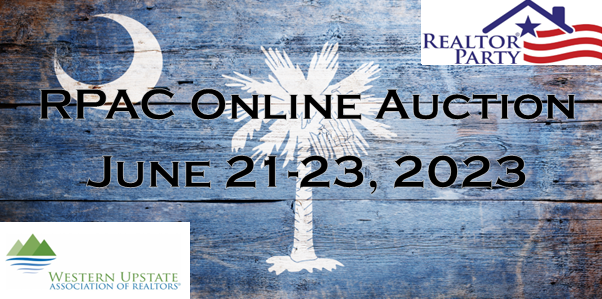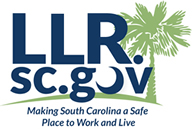
When we invest in RPAC with time and money, we are sending a clear message to our politicians that we care about issues that impact our businesses. Together, we can fight to ensure we are not legislated, litigated or regulated out of business! America is built on real estate. Pledge your commitment to the industry by investing in the REALTORS® Political Action Committee today by bidding on the online auction items below.
100% of investments made on auction items will go to RPAC.
If you do not wish to bid on an item or do not win an item, but still want to support RPAC please click on the donate button below. We appreciate your support!
Accomplishments and Initiatives
Over the last year, your Realtors Association has had some significant successes in government affairs. These are a few of our successes:
Taxes and Fees
In 2022, we defeated a proposed $11,300 impact fee on each new home. The impact fee would only have applied in Anderson School District 1.
There have been other impact fees adopted in the Western Upstate. Easley adopted an impact fee of $3,300 on new homes in 2021. Clemson has had a small impact fee in place since the mid-90s and is considering an increase to $9,700 on each new single-family home.
Road funding is a significant challenge for local governments. Later this year, Anderson County Council will debate a penny sales tax for roads. Pickens County assessed a property tax millage for roads in 2022. Oconee County assesses a road maintenance fee.
Zoning
Much of the Western Upstate is unzoned, which creates challenges for regulating development in those areas. Multiple jurisdictions are considering zoning and development ordinances:
- Anderson County is considering zoning for an area called Fork No. 2 near Lake Hartwell between the Tugaloo River and Beaver Dam Creek.
- Oconee County Planning Commission proposed an automatic zoning procedure for unzoned land if the land is proposed to be subdivided for residential uses and meets certain size requirements. Your association opposes the ordinance and it was tabled.
- Easley is currently updating their zoning ordinance and your association has submitted comments.
- While Pickens County does not have zoning, they are updating their development ordinances to impose rules that are very close to zoning. Your association has submitted comments.
Your association’s position on zoning is that we are neutral; we just want objective standards that facilitate orderly development without adversely affecting the real estate market.
Moratoriums
Moratoriums have become the new favorite way for local governments to pause development when they need to change their ordinances to catch up with development.
- Clemson and Pendleton both enacted moratoriums on multifamily homes in 2021 and 2022.
- Pickens County imposed a moratorium along Highway 11 in 2022.
- Earlier this year, Pickens County enacted another moratorium on new subdivisions larger than 49 lots.
Your association opposes most moratoriums, especially those that are just for the purpose of pushing the pause button, because they are a violation of property owners’ due process rights.
State and National Issues
Your association is also at work at the state and national level. At the State House:
- The Governor signed a bill to allow tourism taxes paid for hotel rooms and restaurant bills to be used for workforce housing needs.
Our most recent national wins have been in court:
- The US Supreme Court ruled that a Minnesota Local Government took private property without compensating the property when they sold a private condo for an unpaid property tax bill and kept the surplus.
- The US Supreme Court also ruled that the EPA misapplied the Clean Water Act when they told an Idaho couple they couldn’t build a house on their land because the property is a wetland. The EPA connected the property to navigable water through ground water to apply the Clean Water Act, which the court said was wrong.
Both of these cases were big wins for Realtors and our efforts to protect private property rights.
Your support of RPAC helps your association represent you in the halls of government.



